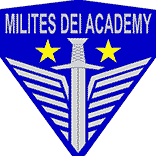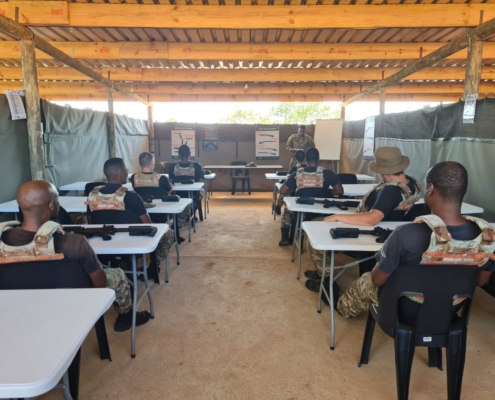Transcript of an interview with an independent industry expert on the importance of tactical firearm training within the security training sector.
Introducing Andre van Tonder from Triplo Training Academy!
Johan Buys (marketing manager at Milites Dei Academy): Welcome, André and thank you for coming to the interview.
André van Tonder (Triplo Training Academy): Johan, thank you for inviting me. It’s always nice to visit you guys in the Lowveld, and it’s a privilege to be here.
Johan: Please tell us a bit about yourself and how long you’ve been involved in training.
André: Johan, I think my formal firearms experience or career started in 1993, when I joined the South African Defense Force. I immediately joined the Potts Practical Shooting Club, where I started to participate in practical shooting competitions. In those days, The Defense Force was, I would say, more or less one of the only organizations that hosted what we nowadays call a three-gun shoots, where we would use handguns, shotguns, and rifles for participating in competitions. From there, things progressed, and I started to train officers within the unit, and specifically in handgun handling. I eventually left the Defense Force and then joined a club in White River, where I was chairman for a number of years. I was provincial secretary for a number of years. During my experience there with the club or my involvement with the club, I trained a number of people in practical shooting, specifically. And from there on, things just basically escalated, and I got more and more involved in training, especially new sports shooters. But then in 2019, I started my own training company, where we do what is called Today accredited firearms training in terms of the Firearms Control Act. And since then, I’ve always been training, and I’ve got my own training center. And up to date, I have trained over 3,000 students. And Basically, that is my experience in firearms in a nutshell.
Johan: What would you say is the roadmap for firearms training in South Africa?
André: In terms of the Firearms Control Act, there is a specific process that needs to be followed if you are interested in obtaining your own firearm, or if you are working for a business that uses firearms, for example, security companies. Now, if I have to outline the roadmap I would say that step number one is one must do your competency training for the type of firearms or firearms that you intend to use. So once you’ve completed your training, you will be issued with a statement of results and a proficiency certificate, which you then use to apply with the South African Police Services for a competency certificate. Now, once you’re issued with a competency certificate, you can then either go into a business line where you can work with a firearms as, for example, a security officer, or if you want to have your own firearms, you can then go to a shop, purchase a firearms, and then apply for a license for that firearm with the South African Police Services. In terms of the accredited training in South Africa, there are basically three levels. The first level is your personal level or your basic level training, and that is the training that is required for you to apply for a competency certificate. The next level is your so-called business purpose level training, and that level training is more or less required by Psira if you want to work as, for example, a security officer with a firearms. And then there is a third level which is not very well supported in South Africa at this stage, and that is the so-called tactical level training. So yes, basically we have the three levels, personal or basic, and then business level, and then tactical level, the level three. So those are the official levels of training. But there are numerous other courses that one can do that are not accredited, that can teach you a number of other skills that are required for firearms users.
Johan: What experience do you have in training security officers?
André: When I opened my training center in 2019, I immediately kicked off with the Milites Dei Academy in White River where they train security officers as part of a longer curriculum, where the officers enroll for a, I think it’s a three, six or a twelve month course. And I was appointed as the dedicated service provider that did the accredited firearms training. And I think I did that for about four years. And during that time, I really established a good rapport with security officers or potential security officers. And I actually grew very fond of the security industry, and I enjoy working with these guys. Since then, I have dealt with a number of other private security companies where I either do training for the officers individually or we do what we call the so-called Regulation 21 training for them that is required by law for officers that work with firearms to do Regulation 21 training at least once every 12 months. So, yeah, since 2019, I’ve with regular dealings with the security industry and specifically security officers. And as I said, I’ve become quite close to the security industry and looking after the needs and the requirements of the officers.
Johan: Do you think that training to business purpose level is sufficient for armed security officers?
André: Yes, Johan, that is a very good question. The challenge with accredited training is that this learner has an expectation to conduct the training and then receive a certificate which will enable them to work with firearms in a work environment. The reality is that very few officers has the time available so that they can spend time on training and gain that practical experience in field to deal with situations like what they can expect to deal with while executing their jobs. The problem or the challenge with accredited training is that we train individuals to meet that minimum requirement. But the over and above stuff normally, very seldomly happens because of a time issue and because of a financial issue on the part of the security officer. I am personally of the opinion that at least Officers must try and conduct or complete the tactical unit standards as well. During the tactical training, we introduce a larger number of scenarios into the training and prepare the officers to deal with these different scenarios. Now, the difference between the way that I train and the way that certain other service providers train is that I try to do my training, let’s call it principle-based. I’m going to teach you a number of principles to apply under certain circumstances. And once equipped with that knowledge, you’re able to apply those principles that you have been taught under a number of different and varying conditions. Instead of teaching someone a technique and where the technique is limited to a specific set of circumstances, and if you suddenly met with another set of circumstances, suddenly, the technique doesn’t work so well. From my side, I would highly recommend that security officers consider completing the tactical level training as well. The idea is not to make them tactical ninjas. The idea is to expose them to a larger and greater variety of conditions and scenarios which they might be exposed to out there in the field and prepare them to deal with these scenarios more effectively. The thing with tactical is it’s not restricted to standing on a shooting line and shooting a number of predetermined shots on a target. With tactical shooting, we introduce movement, we introduce shooting from behind cover, we introduce reloads under stress, et cetera, et cetera, et cetera. Again, from my side, I would highly, highly recommend that officers consider it very seriously to complete the tactical level training as well.
Johan: Is there any other training that you would recommend to make one a more competent firearms owner?
André: Firearm skills is a diminishing skill. So what does that mean? It means that if I don’t practice it regularly, I lose the skills that I had or that I developed up till that point. So what is very important with firearms skills is that you regularly train. Now, the challenge is this, and I see this almost on a daily basis at the gun shop where I have my training center, is the people come in, they purchase a packet of ammunition, and then they stand there on the range and they shoot 20, 50, 100 rounds, but they shoot it while standing still, and they shoot it at a single target without any movement, without any additional skills. They never train strong-hand shooting, they never train support-hand shooting, they never train shooting from behind cover, they never train from shooting uncomfortable situations and so forth. The problem is not many facilities have the ability to train people in these skills. There is a simple way of training, and we call that dry fire training, where we train firearms use skills without the use of ammunition. Because in firearms handling, your manipulation of the firearms counts It’s for about, I would say, 90% of your ability to shoot an accurate shot and all of that can be practiced without firing a single live round. That can all be done through dry fire. And then you just basically have to go to the range every once a month, every two months, and use 20, 50 rounds if you want to, to just confirm that the skills you have been practicing to the dry fire is actually in place and you’ve actually achieved what you want to achieve. So dry fire is something that you can do in your own time, in your own place. And it’s very important that when you do use dry fire training, that you not have any live ammunition even close to you when you’re doing this. And then something else is there. There are two other options that you can follow. And the one is to join a shooting club, a practical shooting club, or a action shooting club like the South African Practical Shooting Association or the South African Defensive Pistols Association Join one of these associations or a club that is affiliated with them, and just go and participate in the event. You don’t have to fork out the huge numbers of money to participate, but just go and participate on a monthly basis, on a two monthly basis and see what is required of you to handle a firearms under a stressful situation. Because believe me, if you’re standing there on that shooting line and that buzzer says, peep, the stress is tremendous. And if you can’t handle that under a competition environment, you’re going to battle to do that under a life-threatening environment. So joining a club is another option. And then the last one that I would recommend is just approach your local training service provider and ask them if they do do additional types of training. And get involved, get involved, shoot your firearms. But as I said, I know that cost is a big issue. Ammonition is expensive. And therefore, dry firing, as far as I’m concerned, is most probably one of the best ways to hone your firearms handling skills. And then just go to the range every one or two months and just go and check that what you’ve been training is actually working for you.
Johan: Thank you so much for the interview, and thank you for your time.
André: No, thank you. Thank you from my side. Thank you for inviting me. Thank you for this opportunity. And yes, I look at many, many more of these opportunities to come. You must have an absolutely awesome day, and send my regards to all the staff at Milites Dei Academy.



Facebook Comments